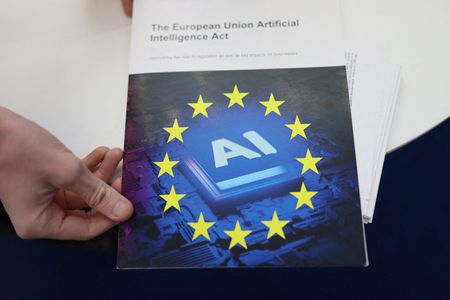By Foo Yun Chee
BRUSSELS (Reuters) -Microsoft will likely sign the European Union’s code of practice to help companies comply with the bloc’s landmark artificial intelligence rules, its president told Reuters on Friday, while Meta Platforms rebuffed the guidelines.
Drawn up by 13 independent experts, the voluntary code of practice aims to provide legal certainty to signatories. They will have to publish summaries of the content used to train their general-purpose AI models and put in place a policy to comply with EU copyright law.
The code is part of the AI Act which came into force in June 2024 and will apply to Google owner Alphabet, Facebook owner Meta, OpenAI, Anthropic, Mistral and thousands of companies.
“I think it’s likely we will sign. We need to read the documents,” Microsoft President Brad Smith told Reuters.
“Our goal is to find a way to be supportive and at the same time one of the things we really welcome is the direct engagement by the AI Office with industry,” he said, referring to the EU’s regulatory body for AI.
Meta reiterated its criticism of the code.
“Meta won’t be signing it. This code introduces a number of legal uncertainties for model developers, as well as measures which go far beyond the scope of the AI Act,” Meta’s chief global affairs officer Joel Kaplan said in a blog post on LinkedIn on Friday.
The U.S. social media giant has the same concerns as a group of 45 European companies, he said.
“We share concerns raised by these businesses that this over-reach will throttle the development and deployment of frontier AI models in Europe, and stunt European companies looking to build businesses on top of them,” Kaplan said.
OpenAI and Mistral have signed the code.
(Reporting by Foo Yun Chee; Editing by Cynthia Osterman)











